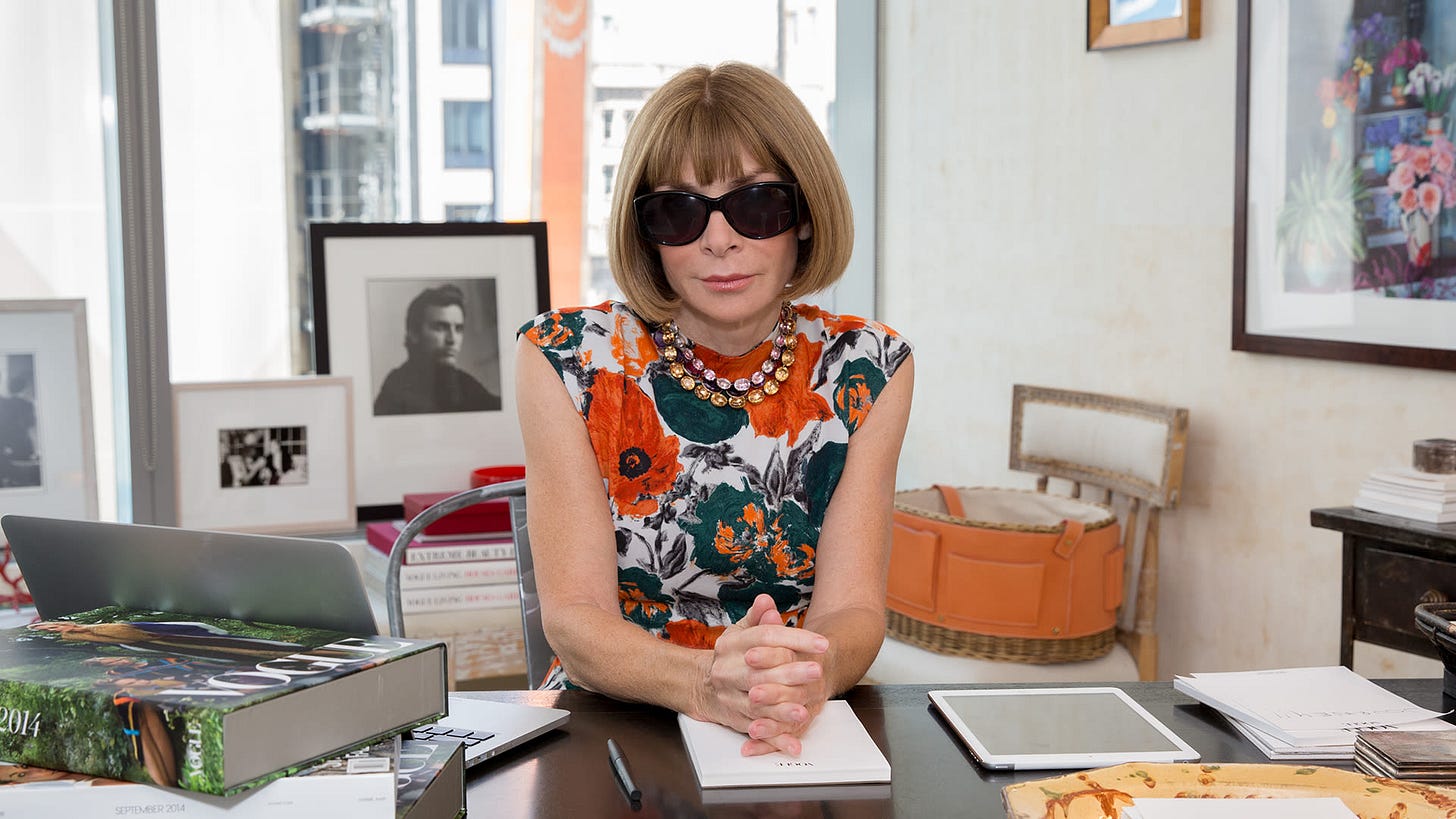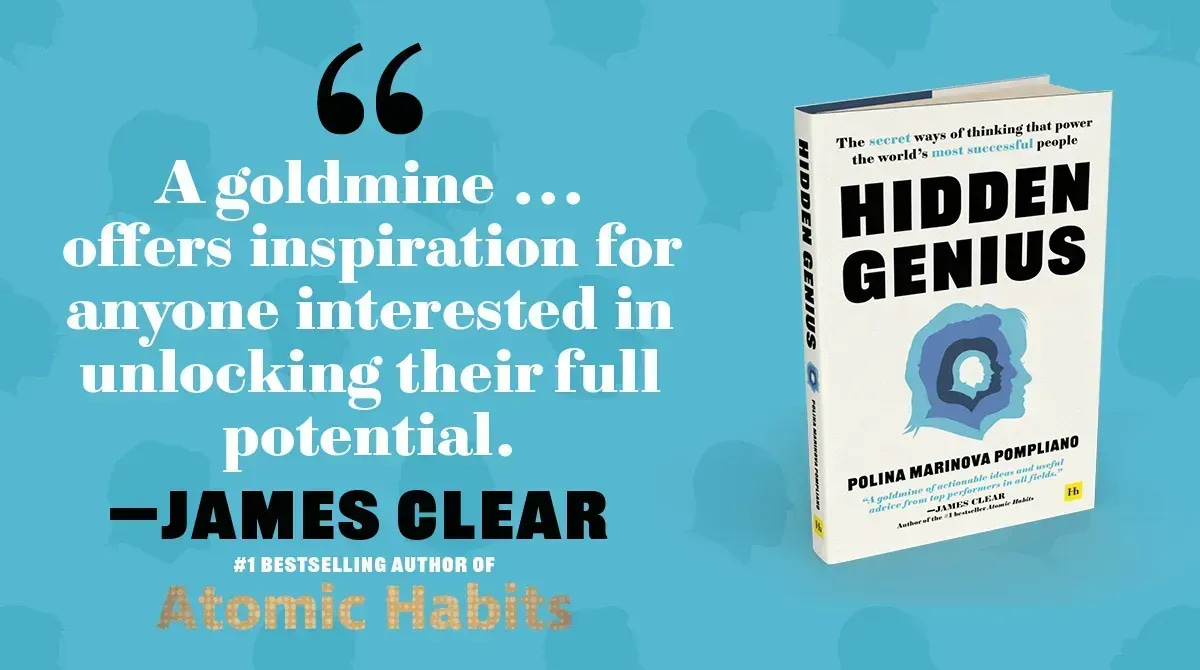The Profile Dossier: Anna Wintour, the Power Broker of the Fashion World
“It’s always about timing. If it’s too soon, no one understands. If it’s too late, everyone’s forgotten.”
A note from Polina: I’m excited to share this Profile Dossier of Anna Wintour, who’s the iconic editor-in-chief of Vogue. It was heavily researched and written by Alexis Derickson, a staff writer for The Profile.
—
Anna Wintour’s name has become synonymous with high fashion. Her classic bob and black sunglasses have turned her into a recognizable—and mysterious— figure.
Wintour has helmed the fashion journalism industry for over 30 years as editor-in-chief of Vogue. Her opinion on designers and collections determines what is “in” and what is “out,” encouraging the likes of French fashion designer Nicolas Ghesquiére to “question if Anna will like it or not” during production at Balenciaga and Louis Vuitton.
So often, readers focus on the apparel and artistry on display in Vogue — yet, behind the glossy pages, Wintour herself became a household name as her influential voice pioneered the industry standard.
With Charles Wintour, the longtime editor of The Evening Standard, as her father, Anna came of age in 1960s London with an understanding of disciplined leadership and striving for the best.
She describes her core management style as exercising strength of conviction while communicating her point of view with clarity and decisiveness.
“People respond well to those that are sure of what they want,” she says.
Spearheading the leading name in fashion publications for more than three decades demands a keen awareness of trends and culture. Through criticism, Wintour transitioned Vogue into content of deeper value in the 2000s, becoming the first to place major celebrities on magazine covers. She was also unafraid to engage in political dialogue.
Her influence extends into the fundraising sphere – most notably, her more than $231 million donated to the Metropolitan Museum of Art’s Costume Institute via the Met Gala. Rivaled by few (if any), the annual benefit draws all eyes to the looks carefully tailored for Wintour’s approval as chairwoman.
Today’s digital era feels omniscient. Online content perpetually expands as an increasing number of magazines shutter the doors on their print publications. While Vogue stays standing, Wintour represents what may be the last of her kind. “Some people have the Bible,” she says. “I have Vogue.”
Here’s what we can learn about leadership, discipline, and originality from the empress of fashion herself, the one and only Anna Wintour.
READ.
On her relentless discipline: Despite Wintour’s connections in the British publishing industry, her dedication to her craft and keen ambition remain undeniable. Amy Odell’s biography “Anna” reveals anecdotes surrounding Wintour’s work-hardy routine, including a strict 5:30 a.m. wake-up time, “brutal” midnight editing, and “militant” Met Gala planning. This latest nonfiction book takes an enthralling dive into all-things Anna.
On how to be a boss: Wintour said her management style “has taken decades to perfect” – time which she has had the benefit of exploring in her over 30-year reign at Vogue. This informative article takes a glimpse into three of the top tips she uses to cultivate her decisive vision and deep-rooted following, pulled straight from her MasterClass.
LISTEN.
On giving back through fundraising and fashion: The first donation Wintour received to A Common Thread was $1 million from Ralph Lauren. The joint fundraising venture with Tom Ford supported fashion businesses impacted by COVID-19, revealing anew how a person of Wintour’s power can use their influence for good. This uniquely casual conversation with Bruce Bozzi at New York’s Via Carota covers her commitment to the next generation through AIDS and HIV support, the reselling of vintage pieces, and the authentic capturing of our imperfect world through fashion.
WATCH.
On her eye for perfection: It’s an understatement to say that Wintour is a perfectionist. Referred to as “the high priestess of fashion,” Wintour wants things done in a very particular way because she believes every detail matters. This documentary takes us into Wintour’s world as she prepares the highly-anticipated September 2007 issue. Take a look at just how demanding the creative process can be.
On her reign as Queen of Vogue: A political fundraising powerhouse, a mother of two, the head of the Met Gala, a Dame of the British Empire, and… the editor-in-chief of Vogue for 34 years. Needless to say, Wintour’s influence spans industries and decades. In this interview, we see Wintour in a relaxed conversation about her most important fashion friendships, journey to Vogue, and more.
On Vogue’s iconic “73 Questions” interviews: Eight years and more than 10 million views later, Wintour answers a second round of rapid-fire questions, delving into life in New York, her family, and her fashion and cultural opinions – all while wearing her quintessential black Chanel sunglasses. This conversation grants a rare glimpse into Wintour’s persona with a hint of dry humor, taking an effortlessly curated stroll through Vogue’s One World Trade Center offices.
On The Devil Wears Prada’s rumors: The veracity of the fictitious, cold-hearted editor portrayed in the movie The Devil Wears Prada has long surrounded Wintour with questions concerning her leadership. “I like people who represent the best of what they do,” she says. “And if that turns you into a perfectionist, then maybe I am.” This 60 Minutes interview puts speculation to rest, exploring Wintour’s influential power over the fashion world and her avoidance of “mediocrity” at all costs.
POLINA’S TAKEAWAYS.
Legacies are built slowly and deliberately: As the editor-in-chief of Vogue for 35 years, Wintour knows that legacies aren’t built in a day. You can’t expect to demand respect if you haven’t shown your work. She says, "If you're an overnight sensation, you can be yesterday's news in no time. Whereas building something slowly and carefully that has value and quality, that's what's going to have legs.” As talent manager Troy Carter once put it: “It’s slow bake versus the microwave.”
Avoid indecision: If there’s one leadership quality Wintour is known for, it’s her decisiveness. "People respond well to those that are sure of what they want,” she says. “What people hate most is indecision. Even if I'm completely unsure, I'll pretend I know exactly what I'm talking about and make a decision.” Although some could argue that this is top-down leadership, Wintour actually emphasizes that she takes into account the opinions of her colleagues, but it doesn’t take her long to decide. Being decisive can help you move more quickly. Even if it’s a mistake, you can iterate and learn faster than someone who waffles for long periods of time.
Learn how to neutralize gossip: As her star has risen, Wintour has been on the receiving end of much criticism, some of which comes down to gossip from people who know little about Wintour, the person. As a result, she has been called many things in her life, and she’s learned how to laugh at all the misperceptions people have about her. "I'm an ice queen, I'm the sun king, I'm an alien fleeing from District 8 and I'm a dominatrix,” she says. “So I reckon that makes me lukewarm royalty with a whip from outer space." Constructive criticism can be helpful, but name-calling is not. If you become the target of gossip or hearsay, learn how to take it in stride and defuse the situation with humor.
Perfection is an illusion: Wintour has some seemingly wacky advice: Aim to get fired at least once in your life. “It forces you to look at yourself. It is important to have setbacks because that is the reality of life,” she says. “Perfection doesn’t exist.” Whether you get fired from a job, you lose a loved one, or your fail at achieving a worthy goal, self-reflection is an important part of personal progress. Take it from Malcolm Gladwell: He says that people are often drawn to things that are done imperfectly. Whether it’s art, movies, or books, people talk more about the flawed things that get stuck in their heads than they do the obvious, perfect things. “You want an aftertaste, and that comes from not everything being perfectly blended together,” he says.
Identify what you don’t like: Wintour started her career as an editorial assistant at Harper’s & Queen in London, where she had her hands in every aspect of the editorial process because the staff was small and the budget was tight. This was one of her best, most impactful work experiences because she says it exposed her to various jobs, and most importantly, it taught her what she didn’t like doing. Many times, we don’t know what we like until we have identified what we don’t like first. She says, “Try different things—it’s almost more important to find out what you don’t like rather than what you do like.”
QUOTES TO REMEMBER.
"The best way to make a dream come true is to wake up."
“It’s always about timing. If it’s too soon, no one understands. If it’s too late, everyone’s forgotten.”
“Fashion goes in only one direction — forward — and I am a firm believer in thinking that way too.”






Fascinating read. Glad to meet Alexis through her writing. I'm into journalism more than Vogue, so I appreciate the way Alexis unpacked this story. Final note for the week: I just finished Hidden Genius and it may be a sleeper. Just because you don't hit NYTimes list right off doesn't mean you've missed the mark on an enormous movement, which us the awakening of differently wired brains among us and the benefits of neurodiversity in how humans think. It's the most exciting and enlightening place to be for everyone awake enough to dive into this new territory.